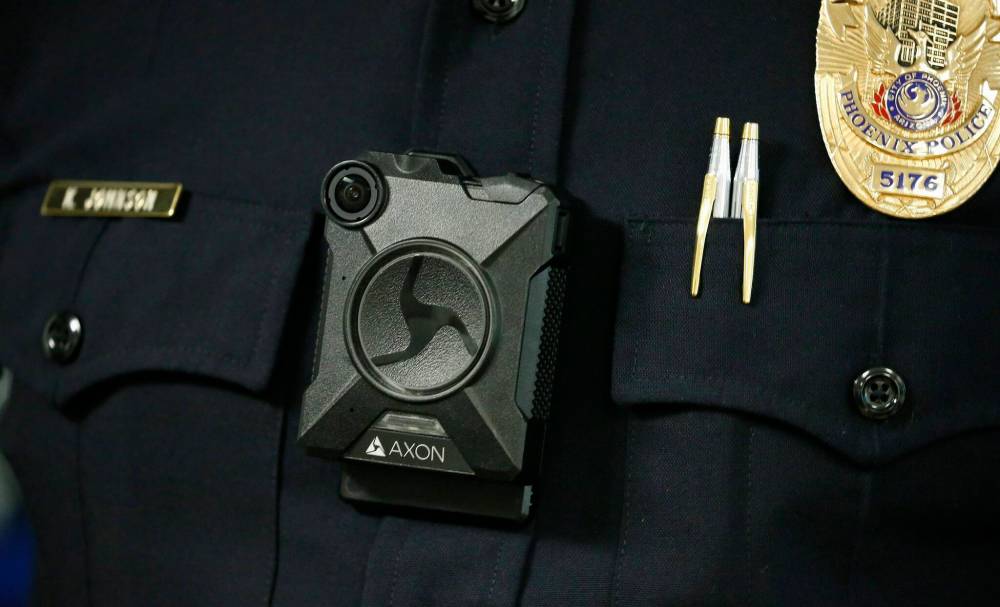Body cameras for Winnipeg police overdue
Advertisement
Read this article for free:
or
Already have an account? Log in here »
To continue reading, please subscribe:
Monthly Digital Subscription
$0 for the first 4 weeks*
- Enjoy unlimited reading on winnipegfreepress.com
- Read the E-Edition, our digital replica newspaper
- Access News Break, our award-winning app
- Play interactive puzzles
*No charge for 4 weeks then price increases to the regular rate of $19.00 plus GST every four weeks. Offer available to new and qualified returning subscribers only. Cancel any time.
Monthly Digital Subscription
$4.75/week*
- Enjoy unlimited reading on winnipegfreepress.com
- Read the E-Edition, our digital replica newspaper
- Access News Break, our award-winning app
- Play interactive puzzles
*Billed as $19 plus GST every four weeks. Cancel any time.
To continue reading, please subscribe:
Add Free Press access to your Brandon Sun subscription for only an additional
$1 for the first 4 weeks*
*Your next subscription payment will increase by $1.00 and you will be charged $16.99 plus GST for four weeks. After four weeks, your payment will increase to $23.99 plus GST every four weeks.
Read unlimited articles for free today:
or
Already have an account? Log in here »
Hey there, time traveller!
This article was published 21/11/2023 (711 days ago), so information in it may no longer be current.
It’s needed, but it’s not even on the agenda yet.
As Winnipeg City Councillor Markus Chambers put it in a Free Press story on Monday (When, not if, for police body cameras: councillor, Nov. 20), body cameras for police are coming. Eventually.
“As digital evidence management becomes more and more mainstream, (body-worn cameras) will inevitably become the default for the majority of police services,” Chambers wrote in an email. “I anticipate that it is a matter of time.”

Ross D. Franklin / AP Files
A body camera being worn by a Phoenix Police Department officer.
But what, exactly, are we waiting for?
It’s been too much time already.
Why?
Because, among other things, footage from the cameras is an impartial eye on how officers — and the people those officers meet, deal with and even arrest — are treated. The cameras improve the transparency of police interactions that may otherwise depend on witness testimony that’s directly contradictory, keep officers more accountable, increase public trust and even help to gather evidence.
Yes, in other jurisdictions, body cams have caught police officers doing unsavoury things, from assaulting handcuffed and helpless prisoners, to planting drugs and weapons on suspects, to working to co-ordinate each others’ testimony.
But catching cops acting improperly or illegally, oddly, is one of the ways that cameras serve to build trust in the police — because the footage helps to prevent bad cops from having their deeds covered up.
(And yes, it goes without saying that video and audio recordings aren’t necessarily the complete and only version of the story. They are, however, persuasive, and without any aspect of self-serving interpretation by either side involved in a police interaction.)
The cameras would have been invaluable, for example, in the inquest into the death of Michael Bagot: a firefighter paramedic told an inquest into Bagot’s 2019 death said he saw a WPS officer with his knee in Bagot’s back during an arrest, a statement corroborated by another nearby witness.
Police officers at the scene, meanwhile, have testified that method of restraint was not used on Bagot.
Body cameras would have cleared up that discrepancy right away.
Keep in mind at this juncture that the Winnipeg Police Service recognizes the value of the devices, and their use has been requested by the force.
So, if city councillors, lawyers, the police service and even members of the public recognize their value, why aren’t WPS officers using body cams yet?
The holdup, as with most things, is money.
In 2021, a program to equip police with more than 1,300 cameras was expected to cost $7 million, with annual data storage costs of $4 million. City council voted down a request to increase the WPS budget to outfit the force with the equipment.
But it’s not just body cams that would improve the situation: as criminal defence lawyer Scott Newman pointed out in a letter to the editor (Cameras long past due, Nov. 17), Winnipeg Police Service vehicles are also without dash cams and interior cameras, while many other Canadian jurisdictions, including the federal RCMP, record both audio and video in police vehicles.
It’s just another situation where valuable technology isn’t finding its way into service. It doesn’t really matter whether the money comes from the provincial government or from municipal police force budgets — what matters is the cameras, both in police vehicles and being worn by officers, get purchased and used.
Let’s stop kicking this cam down the road.
Cameras — and storage costs for police video and audio data — won’t be any cheaper if we just wait.
The question shouldn’t be more long years of pondering the whens or ifs — it should just be the getting it done.
Now.




